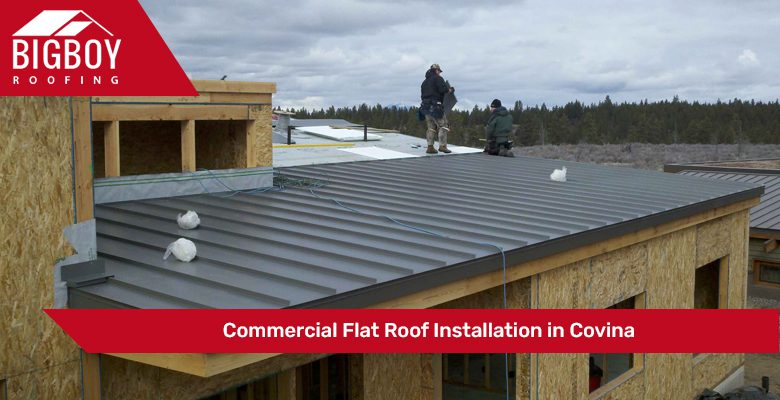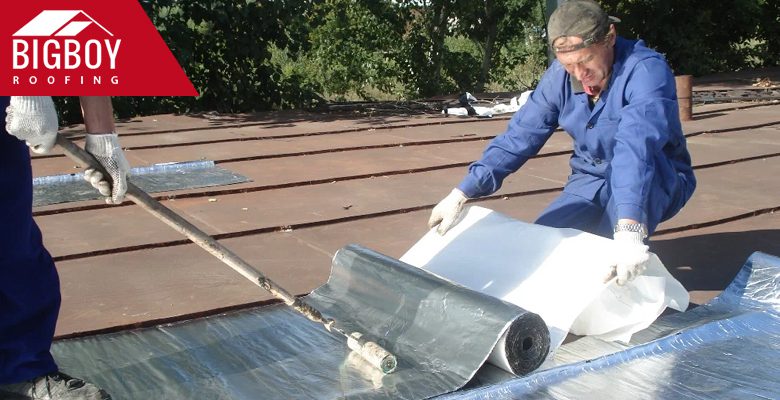Commercial Flat Roof Installation
Commercial flat roof installation provides a practical and efficient roofing solution for businesses in the area. This type of installation focuses on creating a level and horizontal surface for commercial buildings, offering various advantages such as ease of maintenance and cost-effectiveness.

This article will delve into the process and benefits of commercial flat roof installation, highlighting its suitability for businesses needing a reliable and functional roofing system.
Benefits of Flat Roof Installation for Commercial Buildings
Flat roof installation for commercial buildings offers a range of benefits that make it a popular choice among property owners. Here are some key advantages of booking a roofing project with our expert roofing contractors in Covina:
I. Cost-Effective: Flat roofs are generally more cost-effective to install than roofs with steep slopes. The simplicity of the design and the reduced amount of materials required contribute to lower installation costs.
II. Efficient Use of Space: Flat roofs provide usable space in the building. You can use them for various purposes, such as rooftop gardens and outdoor seating.
III. Easy Maintenance: Flat roofs are easier to access and inspect than sloped roofs. Maintenance tasks such as gutter cleaning and repairs can be performed more conveniently and with lower associated costs.
IV. Energy Efficiency: Flat roofs offer the opportunity to incorporate energy-efficient features such as cool roof coatings or insulation, which can improve the building’s energy efficiency. They can reduce heating and cooling costs, contributing to long-term energy savings.
Types of Commercial Flat Roofing Materials
Here are some of the most popular types:
| Type | Description |
| Built-Up Roofing (BUR) | Built-up roofing consists of multiple layers of asphalt and reinforcing materials such as fiberglass or organic felts. These layers are fused using hot asphalt or roofing adhesive. |
| Modified Bitumen | Modified bitumen roofing is made from asphalt reinforced with modifiers such as styrene-butadiene-styrene or atactic polypropylene. It is available in torch-applied rolls or adhered to using hot asphalt or cold adhesives. |
| PVC (Polyvinyl Chloride) | PVC roofing membranes are highly durable and resistant to chemicals, fire, and punctures. In addition, they provide exceptional resistance to weathering, making them suitable for commercial buildings. |
| TPO (Thermoplastic Olefin) | TPO roofing membranes are known for their heat-reflective properties, which help reduce cooling costs. They are lightweight, environmentally friendly, and resistant to UV radiation and chemicals. |
How Is Flat Roof Installation Done?
With our roofing experts, a flat roof installation for commercial buildings typically involves the following steps:

I. Planning and Preparation: Begin by consulting with our professional roofing contractor to assess the specific needs and requirements of your commercial building.
II. Roof Deck Preparation: Ensure the roof deck is clean, dry, and in good condition. Repair any existing damage or structural issues. Install insulation boards or thermal barriers to enhance energy efficiency if required.
III. Membrane Installation: Membrane installation depends on the chosen roofing system. For built-up roofing, your contractor can use layers of asphalt and reinforcing materials.
IV. Flashing and Edge Detailing: Install flashing around roof penetrations such as vents, chimneys, and HVAC units to provide a watertight seal. Properly seal and secure edges and seams to prevent water infiltration.
V. Roof Drainage: Ensure proper drainage by installing gutters, downspouts, and scuppers as necessary. The roof should have a slight slope to facilitate water runoff and prevent ponding.
VI. Maintenance and Regular Inspections: Implement a regular maintenance plan to keep the flat roof in optimal condition. Schedule routine inspections to identify and address any issues before they become significant problems.
Book a roofing consultation today!
Don’t compromise on the safety and integrity of your home’s roof – schedule your roofing consultation now and experience peace of mind knowing that your roofing project is in capable hands.
FAQs
What common materials are used for flat roof installation in commercial buildings?
Several materials for flat roof installation in commercial buildings include modified bitumen, EPDM (ethylene propylene diene monomer), PVC (polyvinyl chloride), TPO (thermoplastic olefin), and built-up roofing (BUR) systems. The choice of material depends on budget, climate, building usage, and desired lifespan.
Can I install a flat roof on my existing commercial building?
In most cases, flat roofs can be installed on existing commercial buildings. However, it’s best to consult with a professional roofing contractor in Covina to assess the feasibility and any necessary modifications.
Is insulation necessary for flat roof installations in commercial buildings?
Yes, insulation is crucial for flat roof installations in commercial buildings. Proper insulation helps regulate temperature, reduces energy consumption, and improves the overall thermal performance of the building. It also helps prevent condensation issues and enhances occupant comfort.
Are flat roofs prone to leaks?
While no roof is entirely immune to leaks, proper installation, regular maintenance, and quality materials can significantly reduce the risk of leaks in flat roofs.

